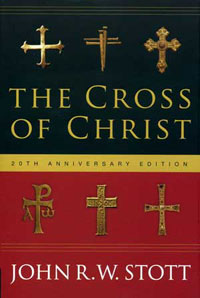Twenty years ago, Hope Church occupied a spot of land next to an auto dealer, a spot the dealer was seeking to buy and the church to sell. The church’s residential neighbors opposed the deal and sought to get the sale blocked by persuading the county commission to deny the dealer’s request to change the use from ‘church’ to ‘car dealership’.
I attended the meeting of the county commission at which this issue was docketed in order to lend personal support the dealer, though I had nothing to say. The memory I brought away from that meeting had nothing to do with property and politics.
I was reading at the time John Stott’s wonderful book on preaching Between Two Worlds. The attorney for the neighborhood (in this context, the ‘enemy’) noticed what I was reading and in a brief conversation told me that he was reading Stott’s The Cross of Christ which had recently been published.
For some reason this stuck in my mind. Were the situation to be repeated today, I would have immediately asked this guy to meet me for lunch or coffee so that I could probe his interest in Stott. (Though twenty years late, I think I might still do that.) But I dropped the conversation, and left simply wondering why he was reading Stott.
Recently, I purchased Stott’s book and have begun to read it. The topic’s, and therefore the book’s, relevance has dimmed not the least over the past twenty years. It seems that the doctrine of the cross continues to be a stumbling block to many, and these days even to those who wish to call themselves evangelical. It is well known that recent thinkers have sought other ways to speak of our redemption, especially those in the emerging church movement. Some have even ridiculed the cross as divine child abuse. It is a doctrine that at worst is under attack, and at best is misunderstood.
If anyone can speak to the issue with clarity, intelligence, wisdom, and power, it is John Stott. I’m looking forward to reading this book. A great turning point in my ministry occurred about 8 years ago when the idea of ‘grace’ was introduced to me in a fresh and powerful way. And grace, as I understand it, is centered upon the cross.
Stott shares an account in the life of the great British preacher Dr. Martyn Lloyd-Jones, one with whom Dr. Stott had some severe ecclesiological disagreements over the years. Lloyd-Jones confessed to friends that “a fundamental change took place in his outlook and preaching in the year 1929.” That change had to do with his understanding of the cross. Here is how Stott relates this:
“After preaching one night in Bridgend, South Wales, the minister challenged him that ‘the cross and the work of Christ’ appeared to have little place in his preaching. He went ‘at once to his favourite secondhand bookshop and asked the proprietor for the two standard books on the Atonement. The bookseller…produced R.W.Dales’s The Atonement (1875) and James Denney’s The Death of Christ (1903). On his return home, he gave himself to study, declining both lunch and tea, and causing his wife such anxiety that she telephoned her brother to see whether a doctor should be called. But when he later emerged, he claimed to have found ‘the real heart of the gospel and the key to the inner meaning of the Christian faith.’ So the content of his preaching changed, and with this its impact. As he himself put it, the basic question was not Anserlm’s ‘why did God become man?’ but ‘why did Christ die?’
I’m anxious to see what he discovered.
BTW, for an assessment of Dr. Stott’s ministry from one who makes no public profession of the Christian faith, see this opinion piece by David Brooks.

TulipGirl
*sigh* I keep adding books to my Amazon wishlist, books I want to read SOME day. . .